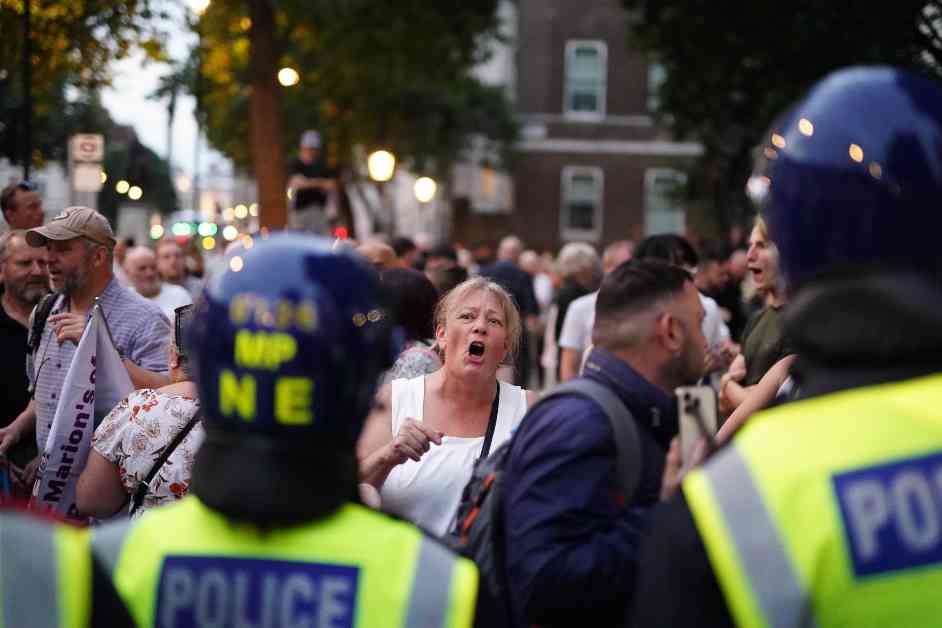Police in Whitehall faced unnecessary aggression during disorder on July 31, with more individuals being charged in connection to the events that unfolded on that day. The recent developments in the case have shed light on the challenges faced by law enforcement officers in maintaining public order and safety in the face of escalating tensions.
Charges and Sentences
One of the individuals charged in relation to the disorder was David Spring, 61, of Longfellow Road in Sutton, who was sentenced to 18 months in jail after pleading guilty to violent disorder at the demonstration. The prosecution highlighted the role of Daniel Thomas, also known as Danny Tommo, in organizing the demonstration in Whitehall. According to Prosecutor Alexander Agbamu, members of the far-right responded to Thomas’s call, seemingly intent on replicating scenes seen earlier in the week, following false information regarding the religion and immigration status of the perpetrator of the Southall murders.
In addition to Spring, a further 12 individuals have been charged, bringing the total number of individuals facing charges to 38. Among those recently charged are a 14-year-old boy, Paul Stevenson, Charles Smith, Russ Cooke, Callum Flynn, Steven Essex, Philip Fahie, Martin Powers, Georgie Jones, Jay Leslie Keeling, Jack Wood, and Jason Guiver. These individuals face a range of charges including public order offenses, affray, obstructing police officers, and racially aggravated offenses.
Police Response and Investigation
Commander Lou Puddefoot expressed gratitude towards the officers who worked tirelessly in reviewing extensive CCTV, phone, and bodycam footage to build the cases being presented before the courts. The officers faced challenging circumstances and encountered unacceptable levels of aggression and abuse during the disorder in Whitehall. Puddefoot emphasized the ongoing commitment of the police force to respond decisively to any outbreak of disorder and to address offenses effectively.
As Puddefoot noted, the work involved in managing large-scale public order incidents does not end once the immediate situation is resolved. The aftermath of such events often requires extensive investigation and coordination to ensure that those responsible for instigating disorder are held accountable. The recent charges and sentences reflect the dedication of law enforcement to uphold the rule of law and maintain public safety in the face of challenging circumstances.
Individual Cases
The individuals charged in connection to the disorder in Whitehall come from diverse backgrounds and face a range of legal consequences based on their actions during the demonstration. From breaching public order conditions to engaging in violent behavior, each case presents a unique set of circumstances that will be addressed in court proceedings.
Paul Stevenson, for instance, faces charges of breaching conditions imposed under Sec 14 of the Public Order Act. Charles Smith has been charged with affray and a public order offense, with his case proceeding to Inner London Crown Court for further deliberation. Russ Cooke faces three racially aggravated public order offenses, underscoring the seriousness of his actions during the demonstration.
Callum Flynn, Steven Essex, Philip Fahie, Martin Powers, Georgie Jones, Jay Leslie Keeling, Jack Wood, and Jason Guiver are among the individuals charged with various offenses related to the disorder. Their cases highlight the complexity of addressing public order disturbances and the importance of holding individuals accountable for their actions in such situations.
In sentencing individuals like Chris Jones and Ryan Atkin to fines and community orders, the courts are sending a clear message that disorderly conduct will not be tolerated. By imposing consequences for public order offenses, the legal system aims to deter future incidents and uphold the principles of law and order in society.
Conclusion
The recent developments in the case of disorder in Whitehall on July 31 underscore the challenges faced by law enforcement in maintaining public order and safety during demonstrations and protests. The charges brought against individuals involved in the disorder highlight the importance of accountability and justice in upholding the rule of law.
As the legal proceedings continue and more individuals face consequences for their actions, it is essential to recognize the dedication and hard work of law enforcement officers in investigating and addressing incidents of public disorder. By holding individuals accountable for their actions, the justice system aims to prevent future instances of aggression and maintain the peace and security of the community.





















